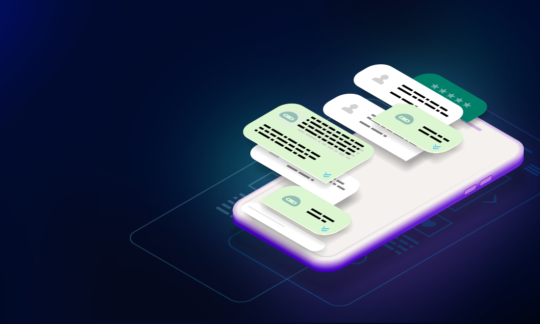The Case For Facebook Messenger AI Chatbots
Table of contents
- What Is a Facebook Messenger Chatbot?
- How Do Messenger Chatbots Work?
- What Are the Cons of Rule-Based Chatbots?
- What Are AI Chatbots?
- How Messenger AI Chatbots Increase Business Efficiency
- Ways Facebook Conversational AI Drives Sales
- More Use Cases for AI Messenger Chatbots
- What Problems Does Facebook Chatbot Solve?
- What Types of Businesses Could Use AI Messenger Chatbots?
- Using SentiOne AI Messenger Chatbots
1.3 billion people use Facebook every month. And of all those, 66% agree that messaging is their preferred way of communicating with a business. With the growing popularity of businesses using Facebook Messenger to communicate with their customers, the need for a more sophisticated chatbot has given rise.
If businesses want to remain competitive and convert consumers where they’re at today (which is increasingly looking to be on social media), they’ll want to know how to harness the power of Messenger chatbots.
What Is a Facebook Messenger Chatbot?
Facebook chatbots are automated software programs that utilise Facebook Messenger to communicate with users with pre-programmed responses and keywords. These bots provide round-the-clock assistance, taking on basic customer queries in order to free up human agents for more complex requests. With the help of Facebook chatbots, customers can get their questions answered quickly and accurately.
How do Facebook chatbots work? Let’s dive deeper into two very different kinds of chatbots.
How Do Messenger Chatbots Work?
First off, it’s important to note the difference between a rule-based chatbot and an AI chatbot. Each of them work very differently when taking a look at the mechanics and outcomes they can have for businesses. Let’s take a look.
Rule-based chatbots operate on a limited set of rules and thus only have so many responses they can generate. They cannot, for example, answer questions outside what they have been programmed to respond to and therefore lack flexibility. You can create these types of chatbots for free if you’re familiar with code or have someone on your team capable of building one with these instructions.
Guidelines for Building Rule-Based Chatbot
If you plan to build your own rule-based chatbot, you’re not alone! Here are some guidelines that will help make your chatbot as effective as it can be.
Keep it Brief
Most Facebook users are on mobile phones. Therefore, it’s best to keep your interactions short so they don’t get distracted by other pings or notifications that could take them away from your messaging.
Maintain Brand Voice
Your brand voice should be maintained across all communication points, including your chatbot. Incorporate slang or jargon that you’d use as if it was on your website or on a sales call to build familiarity and trust with users.
Transfer Call to Live Agent When Necessary
Bots cannot handle every single inquiry that’s given to them. It’s important to set up rules that funnel complicated queries to your live agents so you don’t frustrate your customers with rigid, unhelpful responses.
Avoid Spamming
You visitors don’t want to be bombarded with marketing messages. Try to find balance between promotional messaging and helpful messaging that improves their experience with your brand.
What Are the Cons of Rule-Based Chatbots?
The main con of rule-based chatbots is their limited ability to understand the context of a conversation. Rule-based chatbots are programmed with specific keywords and responses, which can lead to confusion if they do not recognize the context of a user’s request. This can result in unpleasant or inaccurate experiences for users, leading them to turn away from the chatbot instead of engaging in meaningful conversations.
Additionally, creating and managing rulesets can be time-consuming and expensive, as each new conversation requires manual updates or additions to existing rulesets. As such, rule-based chatbots are best used where interactions remain relatively simple and consistent over time.
What Are AI Chatbots?
AI Chatbots, as opposed to rule-based chatbots, are more adaptable and complex and can provide accurate answers in conversational speech. They use machine learning to understand the context and intent of the question before formulating a response. This is accomplished through something called NLU – or natural language understanding – which helps AI bots feel more human when interacting with them.
So what are the advantages of implementing Messenger AI bots?
How Messenger AI Chatbots Increase Business Efficiency
The opportunities are ripe for a business that are open-minded enough to see the advantages of AI Facebook Chatbots. Here are some verifiable outcomes businesses can have if they implement AI into their Messenger chatbots:
Meet Customers Where They Shop Online
There are more than 375,000 people from over 200 countries that engage with bots on Messenger every day. And the number of messages sent to businesses on Facebook has doubled in the past year. By incorporating Facebook Messenger Bot into your business model, you can reach more customers as they use the web today.
Save Time for Your Team (And Your Customers)
Messenger chatbots save time for your teammates by acting as personal assistants, scheduling, editing, and canceling meetings and events. In addition, they can gather feedback, offer news feeds and reminders, and automate business processes like upselling products based on your customer’s shopping history. The opportunities to save time are endless.
Automate Sales
When it comes to automation, Messenger chatbots can track and handle a purchase from the first interaction to the post-sales process. For instance, they can help customers find a particular colour of lipstick or check to see if a specific size or brand is in stock. They also act as a customer service line to help users return products or get in touch with a live agent if needed. It’s predicted that 85% of customer-business relationships will be conducted without human interaction.
Ways Facebook Conversational AI Drives Sales
From a business perspective, AI chatbots help businesses become more efficient, but how do they help them drive sales? With the greater capabilities of AI, bots are not nearly as limited as they once were. From prospecting and nurturing to converting and retaining – Messenger chatbots can help increase bottom-line sales by:
Sharing Updates
Have a new feature coming out for your app? Or perhaps a new inventory just came in that you want to announce? Make your list of contacts who’ve interacted with your Facebook page a chat blast. When your message shows up on their FB feed, they’re sure to feel special and open it.
Engaging and Retaining
No one likes talking to a robot, but with AI conversation bots, you can make your customers feel like they’re talking to a live human being. Engaging the customers with Natural Language Understanding (NLU) goes a long way to engaging your customers and thus retaining them for the long run.
Qualifying Leads
Asking questions of your customers is the best way to qualify them and see if it’s a match. By developing a series of follow-up questions, you can move leads through your sales funnel based on their answers. Facebook chatbots can do this in a natural, mobile-friendly way that’s fast and efficient.
Increasing Conversions
Direct response marketing is a great way to boost sales. Messenger chatbots can help in the following ways:
- Extend special offers to key audiences
- Send exclusive invitations via chat blast
- Make checkout more engaging with personalised offers
- Offer add-ons and upsells
- Get customer feedback for improved efficiency
These are just some of the ways that Messenger chatbots help drive bottom-line sales, but there’s no doubt many other use cases.
More Use Cases for AI Messenger Chatbots
When it comes to how to use Messenger chatbots for your business, options are limitless. Here’s a few more use cases based on different business models:
- Getting a quick answer in an emergency
- Resolving a complaint or problem
- Getting detailed answers or explanations
- Finding a human customer service assistant
- Making a reservation (e.g. restaurant or hotel)
- Paying a bill
- Buying a basic item
- Getting ideas and inspiration for purchases
- Adding yourself to a mailing list or news service
- Communicating with multiple brands using one program
- Engage with your marketing materials
- Track shipments
- Locate nearby business locations
- Make secure purchases
- Save time on customer support
- Provide lead information
- Ask sales questions
What Problems Does Facebook Chatbot Solve?
AI Messenger chatbots have a variety of useful outcomes for your business. Here are some high-level ones:
Cuts Down on Operational Costs
According to a study done in the UK, businesses can save an average of $35,000 a year on operational costs. This remains true for most businesses around the world. Paying for a live agent to answer phones adds up and automation is quickly finding ways to replace those workers.
Automates Repeat Customer Inquiries
When you see a question that gets asked all the time – first of all you should take note of that and include that in your marketing materials. Second of all, Messenger chatbots can help answer those questions based on how well you teach them to answer them.
24/7 Availability
International businesses can benefit from 24/7 availability, regardless of the language barrier and geographic location. Even if you’re not an international business, it’s clear that prompt responses at all hours of the night is a good thing for business.
What Types of Businesses Could Use AI Messenger Chatbots?
There are a variety of businesses that could benefit from AI Chatbots for Messenger:
- E-Commerce Store – More and more e-commerce stores are getting leads from their social media accounts. Being able to answer questions at all hours of the night without human supervision can be like a superpower for your e-commerce store. Watch those sales go up as your employee expenses go down. Especially if the e-commerce store is international, the ability to speak to people from different languages is a must.
- Medicine Industry – Doctors and nurses are often required to work at all hours of the night. They have to be extremely detail-oriented which means that sometimes replying to a customer to make an appointment on social media is the last thing on their plate. By automating this process, they can reduce the time and energy spent reading through messages and replying. Even if the clinic or hospital has a front desk representative, the number of inquiries they can automatically reply to will be a huge time and money saver.
- Travel Industry – Hotels and other travel organisations get a lot of inquiries to book on social media. Gathering sensitive information, handling complaints, providing policies, and answering FAQs can all be automated with AI messenger chatbots. Other travel organisations could benefit from this as well: short-term rental business owners, national parks, travel agencies, airports, and more.
- Real Estate – With an active housing market – people buying, selling, and looking to refinance their loans, the real estate sector could also use AI Messenger chatbots. Scenarios like booking tours, inquiring about the home’s details, questions about hours of availability and more all can be automated.
- Banking – Banks could see a 22% reduction in operating costs through the adoption of Messenger AI Bots. That’s a lot of money that could be used for other things. By automating basic customer service, notifications and reminders, and corporate communications, banks could no doubt invest in chatbots and see a return.
Using SentiOne AI Messenger Chatbots
With the growing prevalence of customers using social media to book appointments, purchase products, and seek customer service – AI chatbots have never been more relevant or helpful. SentiOne chatbots integrate seamlessly with Facebook Messenger, alongside many other social media channels like Twitter, and Instagram. Implementing Facebook conversational AI may be just one of the best ways to remain competitive and profitable in 2023.



